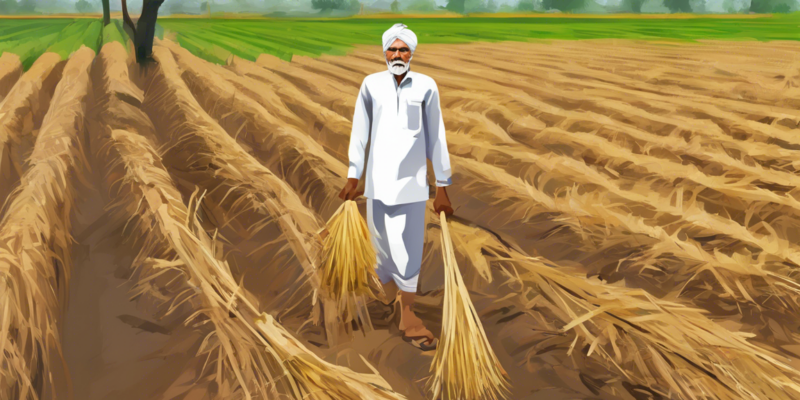Introduction:
The Pradhan Mantri Kisan Samman Nidhi Yojana, also known as the PM Kisan Scheme, is an initiative by the Government of India aimed at providing direct income support to farmers. Under this scheme, eligible farmers receive financial assistance of Rs. 6,000 per year in three equal installments. To ensure transparency and prevent fraudulent activities, the scheme incorporates Know Your Customer (KYC) requirements for beneficiaries. KYC is a process through which institutions verify the identity and address of customers before providing services.
Importance of KYC in PM Kisan Scheme:
-
Preventing Duplicate Payments: KYC helps in verifying the identity of farmers, reducing the chances of duplicate payments to the same beneficiary.
-
Ensuring Targeted Delivery: By authenticating the details of beneficiaries through KYC, the government can ensure that the financial assistance reaches the intended recipients.
-
Enhancing Accountability: KYC requirements increase transparency and accountability in the distribution of funds, making it easier to track the flow of money to farmers.
Types of KYC Documents Accepted:
-
Aadhaar Card: The Aadhaar card is a unique identification document issued by the Government of India. It is widely accepted as a primary KYC document for various schemes, including PM Kisan.
-
Ration Card: Ration cards can also be used as a KYC document to verify the identity and address of beneficiaries.
-
Driving License: A valid driving license with a photo can serve as a KYC document for the PM Kisan Scheme.
-
PAN Card: The Permanent Account Number (PAN) card issued by the Income Tax Department is another valid document for KYC.
Process of KYC Verification:
-
Online Registration: Farmers can register themselves online on the PM Kisan portal by providing their Aadhaar number, bank account details, and other relevant information.
-
Document Submission: After online registration, farmers are required to visit their nearest Common Service Center (CSC) or designated authorities to submit their KYC documents for verification.
-
Physical Verification: In some cases, officials may conduct physical verification at the beneficiary’s residence to validate the information provided during registration.
-
Approval of KYC: Once the documents are verified and found to be authentic, the KYC process is considered complete, and the beneficiary becomes eligible to receive the financial assistance under the PM Kisan Scheme.
Common Issues Faced During KYC Process:
-
Mismatch in Details: Discrepancies in the information provided by the farmer and the details in the KYC documents can lead to delays in the verification process.
-
Incomplete Documentation: Failure to submit all the required KYC documents or providing incomplete information can hinder the KYC verification process.
-
Technical Glitches: Technical issues on the PM Kisan portal or during online registration can also pose challenges for farmers trying to complete the KYC process.
-
Incorrect Bank Details: Providing incorrect bank account details can result in the non-disbursal of financial assistance, even after successful KYC verification.
FAQs (Frequently Asked Questions):
- What is the purpose of KYC in the PM Kisan Scheme?
-
Answer: KYC helps verify the identity of beneficiaries to prevent fraud and ensure that financial assistance reaches the intended farmers.
-
Can I submit my KYC documents online for the PM Kisan Scheme?
-
Answer: While online registration is required, physical submission of KYC documents is typically necessary for verification.
-
Which documents are accepted for KYC in the PM Kisan Scheme?
-
Answer: Aadhaar card, Ration card, Driving License, and PAN card are commonly accepted as KYC documents.
-
How long does the KYC verification process take?
-
Answer: The timeline for KYC verification can vary, depending on the completeness and authenticity of the submitted documents.
-
What should I do if there is a discrepancy in my KYC details?
-
Answer: If there is a mismatch or discrepancy in the KYC details, it is advisable to contact the designated authorities for guidance on rectification.
-
Do I need to re-submit my KYC documents every year for the PM Kisan Scheme?
-
Answer: In most cases, KYC verification is a one-time process, unless there are specific reasons for re-verification.
-
Can I update my KYC details online after the initial verification?
-
Answer: Some changes can be made online, while significant updates may require re-verification through the designated process.
-
What happens if my KYC is rejected for the PM Kisan Scheme?
-
Answer: If your KYC is rejected, you may need to rectify the issues and resubmit the required documents for verification.
-
Is there a helpline or support available for KYC-related queries in the PM Kisan Scheme?
-
Answer: Yes, the PM Kisan portal typically provides contact information or helpline numbers for farmers to seek assistance with KYC-related queries.
-
Can I nominate someone to complete the KYC process on my behalf for the PM Kisan Scheme?
- Answer: While the process may vary, beneficiaries may be allowed to authorize a representative to complete the KYC process on their behalf under certain circumstances.
Conclusion:
In conclusion, KYC requirements play a crucial role in ensuring the transparency and efficacy of the PM Kisan Scheme. By verifying the identity and details of beneficiaries, the government can streamline the distribution of financial assistance to farmers, thereby fulfilling the primary objective of the scheme. Farmers are advised to adhere to the KYC guidelines and promptly address any issues that may arise during the verification process to avail the benefits of the PM Kisan Scheme seamlessly.


Comments